Ceylon tea
Ceylon tea has been known as the best tea in the world for centuries. It was first brought to Sri Lanka by James Taylor in 1867 and the rest, as they say, is history!
Ceylon tea is mainly associated with black tea, although green and other types are also grown on the island. Sri Lanka, despite being a relatively small country, is characterized by a large diversity of terrain.
As a result, Ceylon teas from various regions gain a different, unique flavor bouquet, which they owe to the altitude above sea level, rainfall, soil, sunlight and plant varieties.
Although there are regional nuances, Ceylon tea is known for its distinctive and full-bodied flavor. Most of the teas are handmade which makes them refreshing and bright.
There are three main types of teas grown in Celon:
- The first and at the same time the most popular is black tea. True Ceylon black tea is made from mature stems of the tea bush and fermented leaves.
- The second type is green tea, the production of which avoids the fermentation process. Thanks to this, the tea leaves remain green and the brewed infusion has a straw-green color. The tea leaves are dried and heated right after the rolling process to stop further fermentation.
- The last type is white tea, also known as "Silver Tips", which consists only of hand-picked and sun-dried buds. The buds are plucked from the unique Camellia Sinensis shrub, whose leaves are longer and have silver tips. It is the least processed tea.
Lion logo - Symbol of quality
The Ceylon Tea Symbol Of Quality, better known as the Lion Logo, is a certificate confirming that the tea manufacturer meets the high standards regulated by the Sri Lankan government body - the Ceylon Tea Board.
The logo is the property of the Sri Lanka Tea Board and is a globally recognized trademark. The presence of the Lion symbol on Basilur tea packaging guarantees that you are drinking 100% Ceylon tea, produced and packaged in Sri Lanka.
The Sri Lanka Tea Board has a special unit that tests the quality of teas. This unit, together with the analytical laboratory, is responsible for assessing the tea before auction and export.
For a tea manufacturer to use the Lion logo, it must not only meet certain legal requirements, but also pass strict tests and quality standards.
The seal of approval from the Sri Lanka Tea Board is essential for any tea packaged or branded in Ceylon that is marked with the Lion symbol.
Ceylon Tea Symbol Of Quality guarantees that:
- The package contains 100% Ceylon tea.
- The tea is packed in Ceylon. Foreign importers and packagers are not allowed to use this logo on their products, even if they contain pure Ceylon tea.
- The tea meets strict quality standards regulated by the Sri Lanka Tea Board.
5 regions of Ceylon
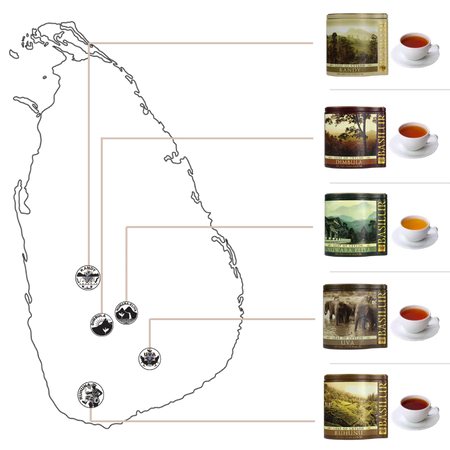
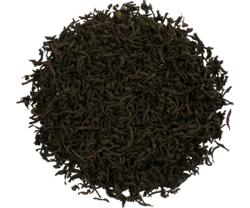
Kandy is the birthplace of Ceylon tea
and the cultural capital of Sri Lanka.
In this district, tea is grown at altitude
from 600 to 1300 meters above sea level.
Tea leaves from local crops allow
enjoy a copper-tinted infusion,
intense spicy-malt taste and aroma.
Basilur tea from the Kandy region is recommended
to all people who appreciate strong teas.
It tastes great served with milk and sweets
additions.
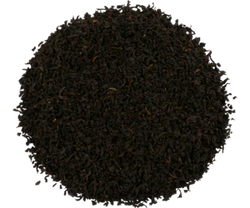
The history of teas from the Dimbula region dates back over a century.
This is one of the most popular high-mountain Ceylon teas.
It is grown at altitudes of 1,250 to 1,650 meters
above sea level. Gives a distinctive infusion with a golden-orange color and a refreshing taste,
which is synonymous with this region.
Basilur Dimbula is an extremely aromatic tea
perfect to start the day.
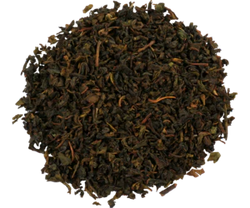
Known for its delicate and exquisite taste,
Nuwara Eliya tea is grown at altitude
almost 2000 meters above sea level.
The climate characterizing this mountain region is low
temperatures and moderate rainfall - makes
that Nuwara Eliya tea gains a unique flavor bouquet.
It is not without reason that it is called the champagne of teas. Basilur Nuwara Eliya produces a delicate infusion with a straw color and a subtle taste with noticeable floral notes.
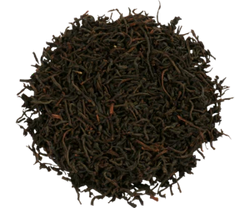
Tea from the Uva region is grown at altitude
from 900 to 1500 meters above sea level.
This picturesquely situated district is exposed to the north-eastern and south-west monsoons, which give the tea grown there a unique, exotic aroma.
It gives an extremely mild infusion with a copper color
and refreshing notes.
It tastes best from the end of July to mid-August,
when the best seasonal Uva teas are produced.
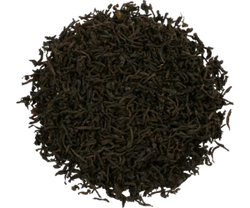
Ruhuna lowland teas grow at an altitude not exceeding 600 meters above sea level.
The unique condition of the soil makes the tea bush
it grows quickly here and gives long, beautiful leaves.
The infusion of Basilur Ruhunu is very dark and strong
and has a slightly sweet taste. It tastes great when served
with milk and sweet additions.


